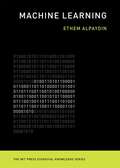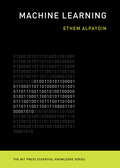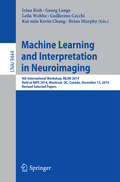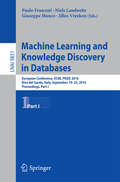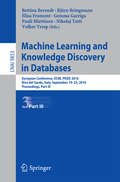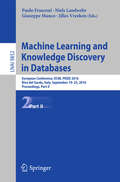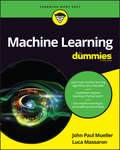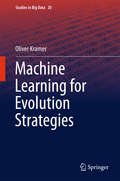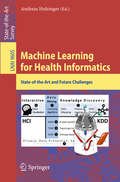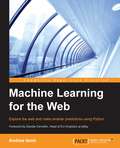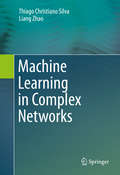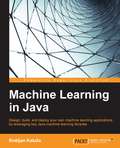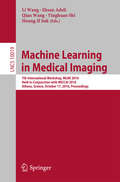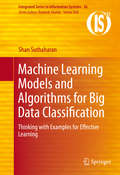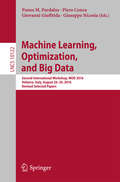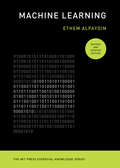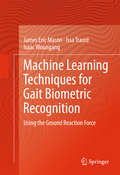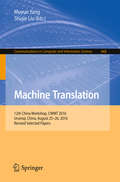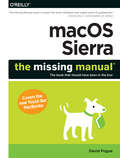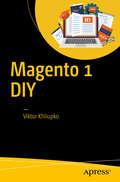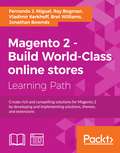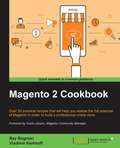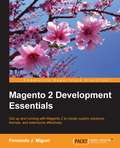- Table View
- List View
Machine Learning: The New AI
by Ethem AlpaydinToday, machine learning underlies a range of applications we use every day, from product recommendations to voice recognition -- as well as some we don't yet use everyday, including driverless cars. It is the basis of the new approach in computing where we do not write programs but collect data; the idea is to learn the algorithms for the tasks automatically from data. As computing devices grow more ubiquitous, a larger part of our lives and work is recorded digitally, and as "Big Data" has gotten bigger, the theory of machine learning -- the foundation of efforts to process that data into knowledge -- has also advanced. In this book, machine learning expert Ethem Alpaydin offers a concise overview of the subject for the general reader, describing its evolution, explaining important learning algorithms, and presenting example applications.Alpaydin offers an account of how digital technology advanced from number-crunching mainframes to mobile devices, putting today's machine learning boom in context. He describes the basics of machine learning and some applications; the use of machine learning algorithms for pattern recognition; artificial neural networks inspired by the human brain; algorithms that learn associations between instances, with such applications as customer segmentation and learning recommendations; and reinforcement learning, when an autonomous agent learns act so as to maximize reward and minimize penalty. Alpaydin then considers some future directions for machine learning and the new field of "data science," and discusses the ethical and legal implications for data privacy and security.
Machine Learning: The New AI (The MIT Press Essential Knowledge Series)
by Ethem AlpaydinA concise overview of machine learning—computer programs that learn from data—which underlies applications that include recommendation systems, face recognition, and driverless cars. Today, machine learning underlies a range of applications we use every day, from product recommendations to voice recognition—as well as some we don't yet use everyday, including driverless cars. It is the basis of the new approach in computing where we do not write programs but collect data; the idea is to learn the algorithms for the tasks automatically from data. As computing devices grow more ubiquitous, a larger part of our lives and work is recorded digitally, and as “Big Data” has gotten bigger, the theory of machine learning—the foundation of efforts to process that data into knowledge—has also advanced. In this book, machine learning expert Ethem Alpaydin offers a concise overview of the subject for the general reader, describing its evolution, explaining important learning algorithms, and presenting example applications. Alpaydin offers an account of how digital technology advanced from number-crunching mainframes to mobile devices, putting today's machine learning boom in context. He describes the basics of machine learning and some applications; the use of machine learning algorithms for pattern recognition; artificial neural networks inspired by the human brain; algorithms that learn associations between instances, with such applications as customer segmentation and learning recommendations; and reinforcement learning, when an autonomous agent learns act so as to maximize reward and minimize penalty. Alpaydin then considers some future directions for machine learning and the new field of “data science,” and discusses the ethical and legal implications for data privacy and security.
Machine Learning and Interpretation in Neuroimaging
by Irina Rish Georg Langs Leila Wehbe Guillermo Cecchi Kai-min Kevin Chang Brian MurphyThis book constitutes the revised selected papers from the 4th International Workshop on Machine Learning and Interpretation in Neuroimaging, MLINI 2014, held in Montreal, QC, Canada, in December 2014 as a satellite event of the 11th annual conference on Neural Information Processing Systems, NIPS 2014. The 10 MLINI 2014 papers presented in this volume were carefully reviewed and selected from 17 submissions. They were organized in topical sections named: networks and decoding; speech; clinics and cognition; and causality and time-series. In addition, the book contains the 3 best papers presented at MLINI 2013.
Machine Learning and Knowledge Discovery in Databases
by Paolo Frasconi Niels Landwehr Giuseppe Manco Jilles VreekenThe three volume set LNAI 9851, LNAI 9852, and LNAI 9853 constitutes the refereed proceedings of the European Conference on Machine Learning and Knowledge Discovery in Databases, ECML PKDD 2016, held in Riva del Garda, Italy, in September 2016. The 123 full papers and 16 short papers presented were carefully reviewed and selected from a total of 460 submissions. The papers presented focus on practical and real-world studies of machine learning, knowledge discovery, data mining; innovative prototype implementations or mature systems that use machine learning techniques and knowledge discovery processes in a real setting; recent advances at the frontier of machine learning and data mining with other disciplines. Part I and Part II of the proceedings contain the full papers of the contributions presented in the scientific track and abstracts of the scientific plenary talks. Part III contains the full papers of the contributions presented in the industrial track, short papers describing demonstration, the nectar papers, and the abstracts of the industrial plenary talks.
Machine Learning and Knowledge Discovery in Databases
by Bettina Berendt Björn Bringmann Élisa Fromont Gemma Garriga Pauli Miettinen Nikolaj Tatti Volker TrespThe three volume set LNAI 9851, LNAI 9852, and LNAI 9853 constitutes the refereed proceedings of the European Conference on Machine Learning and Knowledge Discovery in Databases, ECML PKDD 2016, held in Riva del Garda, Italy, in September 2016. The 123 full papers and 16 short papers presented were carefully reviewed and selected from a total of 460 submissions. The papers presented focus on practical and real-world studies of machine learning, knowledge discovery, data mining; innovative prototype implementations or mature systems that use machine learning techniques and knowledge discovery processes in a real setting; recent advances at the frontier of machine learning and data mining with other disciplines. Part I and Part II of the proceedings contain the full papers of the contributions presented in the scientific track and abstracts of the scientific plenary talks. Part III contains the full papers of the contributions presented in the industrial track, short papers describing demonstration, the nectar papers, and the abstracts of the industrial plenary talks.
Machine Learning and Knowledge Discovery in Databases
by Paolo Frasconi Niels Landwehr Giuseppe Manco Jilles VreekenThe three volume set LNAI 9851, LNAI 9852, and LNAI 9853 constitutes the refereed proceedings of the European Conference on Machine Learning and Knowledge Discovery in Databases, ECML PKDD 2016, held in Riva del Garda, Italy, in September 2016. The 123 full papers and 16 short papers presented were carefully reviewed and selected from a total of 460 submissions. The papers presented focus on practical and real-world studies of machine learning, knowledge discovery, data mining; innovative prototype implementations or mature systems that use machine learning techniques and knowledge discovery processes in a real setting; recent advances at the frontier of machine learning and data mining with other disciplines. Part I and Part II of the proceedings contain the full papers of the contributions presented in the scientific track and abstracts of the scientific plenary talks. Part III contains the full papers of the contributions presented in the industrial track, short papers describing demonstration, the nectar papers, and the abstracts of the industrial plenary talks.
Machine Learning For Dummies
by John Paul Mueller Luca MassaronYour no-nonsense guide to making sense of machine learning Machine learning can be a mind-boggling concept for the masses, but those who are in the trenches of computer programming know just how invaluable it is. Without machine learning, fraud detection, web search results, real-time ads on web pages, credit scoring, automation, and email spam filtering wouldn't be possible, and this is only showcasing just a few of its capabilities. Written by two data science experts, Machine Learning For Dummies offers a much-needed entry point for anyone looking to use machine learning to accomplish practical tasks. Covering the entry-level topics needed to get you familiar with the basic concepts of machine learning, this guide quickly helps you make sense of the programming languages and tools you need to turn machine learning-based tasks into a reality. Whether you're maddened by the math behind machine learning, apprehensive about AI, perplexed by preprocessing data--or anything in between--this guide makes it easier to understand and implement machine learning seamlessly. Grasp how day-to-day activities are powered by machine learning Learn to 'speak' certain languages, such as Python and R, to teach machines to perform pattern-oriented tasks and data analysis Learn to code in R using R Studio Find out how to code in Python using Anaconda Dive into this complete beginner's guide so you are armed with all you need to know about machine learning!
Machine Learning for Evolution Strategies
by Oliver KramerThis bookintroduces numerous algorithmic hybridizations between both worlds that showhow machine learning can improve and support evolution strategies. The set ofmethods comprises covariance matrix estimation, meta-modeling of fitness andconstraint functions, dimensionality reduction for search and visualization ofhigh-dimensional optimization processes, and clustering-based niching. Aftergiving an introduction to evolution strategies and machine learning, the bookbuilds the bridge between both worlds with an algorithmic and experimentalperspective. Experiments mostly employ a (1+1)-ES and are implemented in Pythonusing the machine learning library scikit-learn. The examples are conducted ontypical benchmark problems illustrating algorithmic concepts and theirexperimental behavior. The book closes with a discussion of related lines ofresearch.
Machine Learning for Health Informatics
by Andreas HolzingerMachine learning (ML) is the fastest growing field in computer science, and Health Informatics (HI) is amongst the greatest application challenges, providing future benefits in improved medical diagnoses, disease analyses, and pharmaceutical development. However, successful ML for HI needs a concerted effort, fostering integrative research between experts ranging from diverse disciplines from data science to visualization. Tackling complex challenges needs both disciplinary excellence and cross-disciplinary networking without any boundaries. Following the HCI-KDD approach, in combining the best of two worlds, it is aimed to support human intelligence with machine intelligence. This state-of-the-art survey is an output of the international HCI-KDD expert network and features 22 carefully selected and peer-reviewed chapters on hot topics in machine learning for health informatics; they discuss open problems and future challenges in order to stimulate further research and international progress in this field.
Machine Learning for the Web
by Andrea IsoniExplore the web and make smarter predictions using Python About This Book * Targets two big and prominent markets where sophisticated web apps are of need and importance. * Practical examples of building machine learning web application, which are easy to follow and replicate. * A comprehensive tutorial on Python libraries and frameworks to get you up and started. Who This Book Is For The book is aimed at upcoming and new data scientists who have little experience with machine learning or users who are interested in and are working on developing smart (predictive) web applications. Knowledge of Django would be beneficial. The reader is expected to have a background in Python programming and good knowledge of statistics. What You Will Learn * Get familiar with the fundamental concepts and some of the jargons used in the machine learning community * Use tools and techniques to mine data from websites * Grasp the core concepts of Django framework * Get to know the most useful clustering and classification techniques and implement them in Python * Acquire all the necessary knowledge to build a web application with Django * Successfully build and deploy a movie recommendation system application using the Django framework in Python In Detail Python is a general purpose and also a comparatively easy to learn programming language. Hence it is the language of choice for data scientists to prototype, visualize, and run data analyses on small and medium-sized data sets. This is a unique book that helps bridge the gap between machine learning and web development. It focuses on the difficulties of implementing predictive analytics in web applications. We focus on the Python language, frameworks, tools, and libraries, showing you how to build a machine learning system. You will explore the core machine learning concepts and then develop and deploy the data into a web application using the Django framework. You will also learn to carry out web, document, and server mining tasks, and build recommendation engines. Later, you will explore Python's impressive Django framework and will find out how to build a modern simple web app with machine learning features. Style and approach Instead of being overwhelmed with multiple concepts at once, this book provides a step-by-step approach that will guide you through one topic at a time. An intuitive step-by step guide that will focus on one key topic at a time. Building upon the acquired knowledge in each chapter, we will connect the fundamental theory and practical tips by illustrative visualizations and hands-on code examples.
Machine Learning in Complex Networks
by Thiago Christiano Silva Liang ZhaoThis book presents the features and advantages offered by complex networks in the machine learning domain. In the first part, an overview on complex networks and network-based machine learning is presented, offering necessary background material. In the second part, we describe in details some specific techniques based on complex networks for supervised, non-supervised, and semi-supervised learning. Particularly, a stochastic particle competition technique for both non-supervised and semi-supervised learning using a stochastic nonlinear dynamical system is described in details. Moreover, an analytical analysis is supplied, which enables one to predict the behavior of the proposed technique. In addition, data reliability issues are explored in semi-supervised learning. Such matter has practical importance and is not often found in the literature. With the goal of validating these techniques for solving real problems, simulations on broadly accepted databases are conducted. Still in this book, we present a hybrid supervised classification technique that combines both low and high orders of learning. The low level term can be implemented by any classification technique, while the high level term is realized by the extraction of features of the underlying network constructed from the input data. Thus, the former classifies the test instances by their physical features, while the latter measures the compliance of the test instances with the pattern formation of the data. We show that the high level technique can realize classification according to the semantic meaning of the data. This book intends to combine two widely studied research areas, machine learning and complex networks, which in turn will generate broad interests to scientific community, mainly to computer science and engineering areas.
Machine Learning in Java
by Bostjan KaluzaDesign, build, and deploy your own machine learning applications by leveraging key Java machine learning libraries About This Book * Develop a sound strategy to solve predictive modelling problems using the most popular machine learning Java libraries * Explore a broad variety of data processing, machine learning, and natural language processing through diagrams, source code, and real-world applications * Packed with practical advice and tips to help you get to grips with applied machine learning Who This Book Is For If you want to learn how to use Java's machine learning libraries to gain insight from your data, this book is for you. It will get you up and running quickly and provide you with the skills you need to successfully create, customize, and deploy machine learning applications in real life. You should be familiar with Java programming and data mining concepts to make the most of this book, but no prior experience with data mining packages is necessary. What You Will Learn * Understand the basic steps of applied machine learning and how to differentiate among various machine learning approaches * Discover key Java machine learning libraries, what each library brings to the table, and what kind of problems each are able to solve * Learn how to implement classification, regression, and clustering * Develop a sustainable strategy for customer retention by predicting likely churn candidates * Build a scalable recommendation engine with Apache Mahout * Apply machine learning to fraud, anomaly, and outlier detection * Experiment with deep learning concepts, algorithms, and the toolbox for deep learning * Write your own activity recognition model for eHealth applications using mobile sensors In Detail As the amount of data continues to grow at an almost incomprehensible rate, being able to understand and process data is becoming a key differentiator for competitive organizations. Machine learning applications are everywhere, from self-driving cars, spam detection, document search, and trading strategies, to speech recognition. This makes machine learning well-suited to the present-day era of Big Data and Data Science. The main challenge is how to transform data into actionable knowledge. Machine Learning in Java will provide you with the techniques and tools you need to quickly gain insight from complex data. You will start by learning how to apply machine learning methods to a variety of common tasks including classification, prediction, forecasting, market basket analysis, and clustering. Moving on, you will discover how to detect anomalies and fraud, and ways to perform activity recognition, image recognition, and text analysis. By the end of the book, you will explore related web resources and technologies that will help you take your learning to the next level. By applying the most effective machine learning methods to real-world problems, you will gain hands-on experience that will transform the way you think about data. Style and approach This is a practical tutorial that uses hands-on examples to step through some real-world applications of machine learning. Without shying away from the technical details, you will explore machine learning with Java libraries using clear and practical examples. You will explore how to prepare data for analysis, choose a machine learning method, and measure the success of the process.
Machine Learning in Medical Imaging
by Li Wang Ehsan Adeli Qian Wang Yinghuan Shi Heung-Il SukThis book constitutes the refereed proceedings of the 7th International Workshop on Machine Learning in Medical Imaging, MLMI 2016, held in conjunction with MICCAI 2016, in Athens, Greece, in October 2016. The 38 full papers presented in this volume were carefully reviewed and selected from 60 submissions. The main aim of this workshop is to help advance scientific research within the broad field of machine learning in medical imaging. The workshop focuses on major trends and challenges in this area, and presents works aimed to identify new cutting-edge techniques and their use in medical imaging.
Machine Learning in Medical Imaging: 7th International Workshop, MLMI 2016, Held in Conjunction with MICCAI 2016, Athens, Greece, October 17, 2016, Proceedings (Lecture Notes in Computer Science #10019)
by Li Wang, Ehsan Adeli, Qian Wang, Yinghuan Shi and Heung-Il SukThis book constitutes the refereed proceedings of the 7th International Workshop on Machine Learning in Medical Imaging, MLMI 2016, held in conjunction with MICCAI 2016, in Athens, Greece, in October 2016. The 38 full papers presented in this volume were carefully reviewed and selected from 60 submissions. The main aim of this workshop is to help advance scientific research within the broad field of machine learning in medical imaging. The workshop focuses on major trends and challenges in this area, and presents works aimed to identify new cutting-edge techniques and their use in medical imaging.
Machine Learning Models and Algorithms for Big Data Classification
by Shan SuthaharanThis book presents machine learning models and algorithms to address big data classification problems. Existing machine learning techniques like the decision tree (a hierarchical approach), random forest (an ensemble hierarchical approach), and deep learning (a layered approach) are highly suitable for the system that can handle such problems. This book helps readers, especially students and newcomers to the field of big data and machine learning, to gain a quick understanding of the techniques and technologies; therefore, the theory, examples, and programs (Matlab and R) presented in this book have been simplified, hardcoded, repeated, or spaced for improvements. They provide vehicles to test and understand the complicated concepts of various topics in the field. It is expected that the readers adopt these programs to experiment with the examples, and then modify or write their own programs toward advancing their knowledge for solving more complex and challenging problems. The presentation format of this book focuses on simplicity, readability, and dependability so that both undergraduate and graduate students as well as new researchers, developers, and practitioners in this field can easily trust and grasp the concepts, and learn them effectively. It has been written to reduce the mathematical complexity and help the vast majority of readers to understand the topics and get interested in the field. This book consists of four parts, with the total of 14 chapters. The first part mainly focuses on the topics that are needed to help analyze and understand data and big data. The second part covers the topics that can explain the systems required for processing big data. The third part presents the topics required to understand and select machine learning techniques to classify big data. Finally, the fourth part concentrates on the topics that explain the scaling-up machine learning, an important solution for modern big data problems.
Machine Learning, Optimization, and Big Data
by Panos M. Pardalos Piero Conca Giovanni Giuffrida Giuseppe NicosiaThis book constitutes revised selected papers from the Second International Workshop on Machine Learning, Optimization, and Big Data, MOD 2016, held in Volterra, Italy, in August 2016. The 40 papers presented in this volume were carefully reviewed and selected from 97 submissions. These proceedings contain papers in the fields of Machine Learning, Computational Optimization and DataScience presenting a substantial array of ideas, technologies, algorithms, methods and applications.
Machine Learning Refined
by Jeremy Watt Reza Borhani Aggelos K. KatsaggelosProviding a unique approach to machine learning, this text contains fresh and intuitive, yet rigorous, descriptions of all fundamental concepts necessary to conduct research, build products, tinker, and play. By prioritizing geometric intuition, algorithmic thinking, and practical real world applications in disciplines including computer vision, natural language processing, economics, neuroscience, recommender systems, physics, and biology, this text provides readers with both a lucid understanding of foundational material as well as the practical tools needed to solve real-world problems. With in-depth Python and MATLAB/OCTAVE-based computational exercises and a complete treatment of cutting edge numerical optimization techniques, this is an essential resource for students and an ideal reference for researchers and practitioners working in machine learning, computer science, electrical engineering, signal processing, and numerical optimization.
Machine Learning, revised and updated edition: The New Ai (The MIT Press Essential Knowledge series)
by Ethem AlpaydinA concise overview of machine learning--computer programs that learn from data--the basis of such applications as voice recognition and driverless cars.Today, machine learning underlies a range of applications we use every day, from product recommendations to voice recognition--as well as some we don't yet use everyday, including driverless cars. It is the basis for a new approach to artificial intelligence that aims to program computers to use example data or past experience to solve a given problem. In this volume in the MIT Press Essential Knowledge series, Ethem Alpaydin offers a concise and accessible overview of "the new AI." This expanded edition offers new material on such challenges facing machine learning as privacy, security, accountability, and bias. Alpaydin, author of a popular textbook on machine learning, explains that as "Big Data" has gotten bigger, the theory of machine learning--the foundation of efforts to process that data into knowledge--has also advanced. He describes the evolution of the field, explains important learning algorithms, and presents example applications. He discusses the use of machine learning algorithms for pattern recognition; artificial neural networks inspired by the human brain; algorithms that learn associations between instances; and reinforcement learning, when an autonomous agent learns to take actions to maximize reward. In a new chapter, he considers transparency, explainability, and fairness, and the ethical and legal implications of making decisions based on data.
Machine Learning Techniques for Gait Biometric Recognition
by James Eric Mason Issa Traoré Isaac WoungangThis book focuses on how machine learning techniques can be used to analyze and make use of one particular category of behavioral biometrics known as the gait biometric. A comprehensive Ground Reaction Force (GRF)-based Gait Biometrics Recognition framework is proposed and validated by experiments. In addition, an in-depth analysis of existing recognition techniques that are best suited for performing footstep GRF-based person recognition is also proposed, as well as a comparison of feature extractors, normalizers, and classifiers configurations that were never directly compared with one another in any previous GRF recognition research. Finally, a detailed theoretical overview of many existing machine learning techniques is presented, leading to a proposal of two novel data processing techniques developed specifically for the purpose of gait biometric recognition using GRF. This book · introduces novel machine-learning-based temporal normalization techniques · bridges research gaps concerning the effect of footwear and stepping speed on footstep GRF-based person recognition · provides detailed discussions of key research challenges and open research issues in gait biometrics recognition · compares biometrics systems trained and tested with the same footwear against those trained and tested with different footwear
Machine Translation
by Muyun Yang Shujie LiuThis book constitutes the refereed proceedings of the 12th China Workshop on Machine Translation, CWMT 2016, held in Urumqi, China, in August 2016. The 10 English papers presented in this volume were carefully reviewed and selected from 76 submissions. They deal with statistical machine translation, hybrid machine translation, machine translation evaluation, post editing, alignment, and inducing bilingual knowledge from corpora.
macOS Sierra: The book that should have been in the box
by David PogueWith Sierra, Apple brings never-before-seen features to macOS--like Siri voice control, file sharing across all your iOS devices, picture-in-picture mode for iTunes and Safari, and AI photo search. Once again, David Pogue brings his humor and expertise to the #1 bestselling Mac book.Whether you're a developer or a home-user, this guide offers a wealth of detail on Apple's OS X 10.12 operating system, this new edition covers everything Sierra has to offer.Perfect for newcomers. Get crystal-clear, jargon-free introduction to the Dock, the macOS folder structure, Safari, Mail, and iCloud.Go in-depth. Learn how to use key new features such as Optimized Storage, the Universal Clipboard, Siri for Mac, and iCloud Drive Sync.Get the full story. David Pogue doesn't stop at telling you how to use macOS features. He wants you to know why to use them--and how to avoid common pitfalls.
Magento 1 DIY
by Viktor KhliupkoLearn how Magento 1 works and how to manage it via easy and advanced techniques. Magento continues to be a top choice for eCommerce solutions in small and large businesses, and many systems are still running on Magento 1. x. This book is specifically designed for these versions. Aimed at entrepreneurs, marketers, and other experts interested in eCommerce, Magento 1 DIY shows you how to set up and configure Magento 1 for your own project. You will also learn how to use extensions, templates and enterprise features guided by easy-to-understand, real-world examples. What You Will Learn: Set up, configure, use templates, designs and extensions Optimize security and performance Integrate with PIM, ERP, CRM, and other enterprise systems Who This Book Is For: Anyone who wants to learn the basics of all aspects of Magento. You do not need any previous experience with Magento.
Magento 2 - Build World-Class online stores
by Bret Williams Fernando J. Miguel Jonathan Bownds Ray Bogman Vladimir KerkhoffCreate rich and compelling solutions for Magento 2 by developing and implementing solutions, themes, and extensions About This Book • Be proficient in the main functionalities, resources, and system structure of Magento 2 • Get to grips with this practical and hands-on guide to raise your web development skills to the next level • Packed with several advanced recipes, not just to manage your online store, but to extend and design it as well Who This Book Is For The ideal target audience for this course could be anyone who wants to mould their skills in building amazing e-commerce websites using Magento. We begin right from getting you started with Magento to becoming an expert at building your own online stores with it. What You Will Learn • Install and set up the Magento Ecosystem • Carry out performance adjustments to speed up your Magento system • Transfer your Magento 1 database to Magento 2 using the Magento 2 system tools • Build a Magento 2 multi-store by creating a root catalog, subdirectories, and products • Design custom themes within the Magento 2 framework • Create extensions using Magento 2 • Discover what makes Magento 2 different and more powerful In Detail Magento is the leading e-commerce software trusted by world`s leading organizations. Used by thousands of merchants for their transactions worth billions, it provides the flexibility to customize the content and functionality of your website. Our Magento Course will help you gain knowledge and skills that are required to design & develop world class online stores. Magento 2 Development Essentials - This book begins by setting up Magento 2 before gradually moving onto setting the basic options of the Sell System. You will learn Search Engine Optimization aspects, create design and customize theme layout, and adjust the Magento System to achieve great performance. Magento 2 Cookbook – This book is divided into several recipes, which show you which steps to take to complete a specific action. It will cover configuring your categories and products, performance tuning, creating a theme, developing a module etc. At the end of this book, you will gain the knowledge to start building a success website. Mastering Magento 2 - This is a comprehensive guide to using the all new features and interface of Magento 2 to build, extend, and design online stores. This book is your roadmap to managing your Magento store which teaches advanced and successful techniques. Focusing on Magento's Community version, this book offers you advanced guidance on managing, optimizing, and extending your store while taking advantage of the new features of Magento 2. This Learning Path combines some of the best that Packt has to offer in one complete, curated package. It includes content from the following Packt products • Magento 2 Development Essentials by Fernando J. Miguel • Magento 2 Cookbook by Ray Bogman and Vladimir Kerkhoff • Mastering Magento 2 by Bret Williams and Jonathan Bownds Style and approach This course begins by setting up Magento 2 before gradually moving on to setting the basic options of the Sell System. You will master Search Engine Optimization aspects, create designs and customize theme layouts, develop new extensions, and adjust the Magento System to achieve great performance. The book covers everything from creating and managing multiple stores to fine-tuning Magento for speed and performance.
Magento 2 Cookbook
by Vladimir Kerkhoff Ray BogmanOver 50 practical recipes that will help you realize the full potential of Magento in order to build a professional online store About This Book * Take advantage of the latest features in Magento 2 to set up an e-commerce store that fits your business needs * Packed with several advanced recipes, not just to manage your online store, but to extend and design it as well * Written in a cookbook style, you can pick and choose your recipe to carry out your day- to- day Magento store tasks Who This Book Is For The book is for existing Magento users who want to gain further expertise and insights into managing, designing, and extending their online store in Magento to fit their business needs. Working knowledge of Magento and basic familiarity with programming is expected. What You Will Learn * Set up a Magento 2 project on Apache or Nginx. * Transfer your Magento 1 database to Magento 2 using the Magento 2 system tools. * Boost the performance of Magento 2 by enabling different types of caching. * Build a Magento 2 multi-store by creating a root catalog, subdirectories, and products. * Create and manage pages, blocks, and front-end apps. * Manage your Magento store by setting up the correct TAX rules. * Design custom themes within the Magento 2 framework. * Create basic and advanced extensions using Magento 2. In Detail Magento 2 is an open source e-commerce platform that has all the functionality to function from small to large online stores. It is preferred by developers and merchants due to its new architecture, which makes it possible to extend the functionalities with plugins, a lot of which are now created by the community. This merchant and developer guide is packed with recipes that cover all aspects of Magento 2. The recipes start with simple how-to's then delve into more advanced topics as the book progresses. We start with the basics of setting up a Magento 2 project on Apache or Nginx. Next, you will learn about basics including system tools and caching to get your Magento 2 system ready for the real work. We move on to simple tasks such as managing your store and catalog configuration. When you are familiar with this, we cover more complex features such as module and extension development. Then we will jump to the final part: advanced Magento 2 extensions. By the end of this book, you'll be competent with all the development phases of Magento 2 and its most common elements. Style and approach Step by step guide for real world tasks for Magento users to gain a more advanced insight on managing, extending and designing their e-commerce store to fit their business needs.
Magento 2 Development Essentials
by Fernando J. MiguelGet up and running with Magento 2 to create custom solutions, themes, and extensions effectively About This Book * Create unique solutions for Magento 2 by developing and implementing solutions, themes, and extensions * Be proficient in the main functionalities, resources, and system structure of Magento 2 * Get to grips with this practical and hands-on guide to raise your web development skills to the next level Who This Book Is For If you are a PHP developer who wants to improve your skills in e-commerce development by creating themes and extensions for Magento 2, then this book is for you. What You Will Learn * Install and set up the Magento Ecosystem * Choose the best options for Magento's Sell System features * Work with Search Engine Optimization in Magento * Create and customize themes for Magento * Develop extensions for new Magento functionalities * Package extensions to publish in the Magento Connect network * Create Magento solutions for mobile devices * Carry out performance adjustments to speed up your Magento system In Detail Magento is the e-commerce software and platform trusted by the world's leading brands. Used by thousands of merchants for their transactions worth billions, it provides the flexibility to customize the content and functionality of your website. By strengthening your fundamentals in Magento development, you can develop the best solutions and take advantage of the growing market. This fast-paced tutorial will provide you with skills you need to successfully create themes, extensions, and solutions to Magento 2 projects. This book begins by setting up Magento 2 before gradually moving onto setting the basic options of the Sell System. You will take advantage of Search Engine Optimization aspects, create design and customize theme layout, develop new extensions, and adjust the Magento System to achieve great performance. By sequentially working through the steps in each chapter, you will quickly explore all the features of Magento 2 to create a great solution. With ample examples and a practical approach, this book will ensure your success with this astonishing e-commerce management system. Style and approach This book would be a fast-paced tutorial guide that uses hands-on examples to developing new solutions for Magento e-commerce system. Each topic is explained sequentially in the process of creating a Magento solution, along with detailed explanations of the basic and advanced features of Magento 2.
